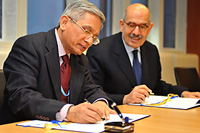
IAEA Director General Mohamed ElBaradei and Ambassador Saurabh Kumar of India sign the India Safeguards agreement, Vienna, Austria, 2 February 2009.
(Source:
IAEA.org)
The International Atomic Energy Agency (IAEA) defines a
Safeguards Agreement as:
An agreement for the application of safeguards
concluded between the IAEA and a State or a group of States, and,
in certain cases, with a regional or bilateral inspectorate, such
as Euratom and ABACC. Such an agreement is concluded either because
of the requirements of a project and supply agreement, or to
satisfy the relevant requirements of bilateral or multilateral
arrangements, or at the request of a State to any of that State's
nuclear activities.
Safeguards Agreements exist to provide confidence to the
International Community that nuclear material, non-nuclear material
(heavy water, zirconium tubes, etc.), facilities, and/or equipment
that could be used for military goals are only used for peaceful
purposes.
There are currently multiple types of safeguards agreements in
place between the IAEA and states. Under the NPT, all NNWS must
have a Comprehensive Safeguards Agreement (CSA) in place with the
IAEA based on the requirements outlined in INFCIRC 153*. A CSA provides for the IAEA's
right and obligation to ensure that safeguards are applied "on all
source or special fissionable material in all peaceful nuclear
activities within the territory of the State, under its
jurisdiction, or carried out under its control anywhere."
Prior to widespread acceptance of the NPT and INFCIRC 153* safeguards, the IAEA used INFCIRC 66 safeguards. While NPT deliberations
were still on-going, it became clear that NNWS with advanced
civilian nucelar programs would never agree to INFCIRC 66 safeguards as they provided too
much power to the IAEA Secretariat and required too many IAEA
inspections. The concern was that these issues would hamper states'
ability to turn a profit in the civilian nuclear markets. Thus, INFCIRC 153* safeguards were required for NPT
signatory states with changes focused mainly on:
- Limiting inspectors to previously agreed upon measurement
points
- Less frequent inspections
- Detailed activities that inspectors are allowed to perform
NWS are not required to have a CSA with the IAEA. However,
concerns from NNWS that a lack of CSAs in NWS provides an economic
advantage have resulted in Voluntary Offer Agreements (VOA). Under
such agreements, NWS offer nuclear material and facilities in the
civilian nuclear fuel cycle for IAEA safeguards. A VOA follows the
same guidelines from INFCIRC 153*. All five NWS (U.S., Russia,
China, France, United Kingdom) have VOAs with the IAEA.